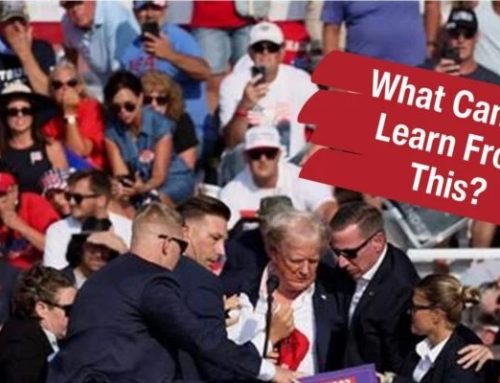
This article originally appeared at Ammoland.
In case you hadn’t noticed, there’s been a big political debate about gun control in the aftermath of the horrific Las Vegas attack. This event set the record for fewest minutes to politicize once the news hit.
That got me thinking. Why the mad dash to policy “solutions?” No, seriously. Why is there always an instant knee-jerk reaction to impose gun control measures after any significant attack involving guns? Yeah, I know, there’s a deep-seated political agenda at play that seeks any and all opportunities to advance the cause. I get that. What’s less obvious is why ordinary people usually not immersed in the gun rights debate jump on the same bandwagon.
I was having a civil discussion online recently, and the following comment was included.
“It would be wonderful if responsible gun owners would come to the table with constructive ideas to stop the next one.“
Don’t take that out of context; it wasn’t in any way intended to be snarky or biting. As I said, we were having a respectful discussion about our different points of view. Anyway, it got me thinking. We hear comments like that one frequently. When I hear it, what my brain processes is something like this:
“Why don’t gun owners accept more ‘common sense’ gun restrictions, laws, and policies?“
And therein lies the key. The question always starts from a premise of “fixing the gun issue.” It’s never, ever about how to address the broader issue of people with bad intentions. How do we know this?
When similar attacks happen that don’t involve the use of a gun, there is never a similar cry about implementing common sense restrictions on trucks, cans of gasoline and whatever else a terrorist or homicidal maniac chooses to use. Have we already forgotten the Nice France attack that was even worse than this one, but done with a truck? Have you ever even heard of the 2011 Monterrey Casino attack? Cartel thugs stormed and doused the facility with gasoline. All 52 people killed died from either fire or smoke inhalation. 52 people from cans of gasoline. Let that sink in.
In those situations, society rapidly accepted the universal truth that there are, and always have been, evil people who will choose to inflict harm on innocents. There was never a moments discussion of restricting truck or fuel “rights.” That’s not a defeatist attitude; it’s just a simple and somewhat demoralizing fact. As a society, no matter how many laws we make and how many things we ban, we can’t stop every person everywhere who quietly plans to inflict harm.
Does that mean we give up? Of course not, but to think that knee-jerk solutions will legislate away human behavioral issues is a fantasy. Gun rights supporters know, from decades of data, that these solutions don’t work and that’s why we oppose them. Are we in favor of restricting access to criminals and mentally unstable people? Sure. In fact, the organization everyone loves to label “terrorist” (that would be the NRA) has pushed Washington to do exactly that and made great strides in the process. But blaming the broad community of law-abiding citizens for the act of an evil few is not a recipe for success and drives the backlash. How would the casual wine drinker and car driver react if exposed to a constant media drumbeat of “It’s your fault!!!” every day when more people were murdered by drunk drivers?
I personally think fear drives the response and I get that. Why else would we accept the fact that drunk drivers murder more people than idiots with guns? No one gets upset about that, yet in the first 24 hours after the Las Vegas attack, 39 Americans were murdered in the US, and 39 more every single 24-hour period throughout the year. Yet there’s no national emotional outrage. I think it’s because the same people screaming for gun control like their beer but don’t understand the role of guns. And make no mistake, as a conscious and deliberate choice, drunk driving deaths are murder, not “accidents.” However, there’s no outrage against beer or four-door cars.
When a gun is involved, there is never any talk of man’s evil nature; the discussion goes directly to gun control within minutes. Why? I suppose it’s fear of the unknown and a compelling need to do something – anything – to make things better, even if deep down in our hearts we know it’s a pointless and ineffective solution. The problem is that people who aren’t familiar with the issues don’t yet know what is and isn’t a pointless solution. We all tend to become instant policy experts on whatever topic flashes across the newswires on any given day. After reading a couple of articles and scanning some headlines, we as human debate bots are ready to take on the world, right? The problem with the gun rights topic is that you and I, as Ammoland community participants, are generally far more informed on gun rights issues than the average Joe who scans the headlines after a tragic crime like the one in Las Vegas. That’s not a pompous or arrogant statement. There are plenty of people far more informed than I am on a myriad of policy issues. This one just happens to the one where I have deep knowledge based on lots and lots of data and study. I suspect you do too.
So what do you do?
Arguing doesn’t work. It may feel good and even satisfying to call the other side stupid, but it won’t accomplish anything. Few people are actually stupid. They might have beliefs that differ from ours, but that could stem from a variety of reasons. Ignorance sounds like an insult but it’s not. It’s just a lack of knowledge on a given topic. We’re all ignorant about plenty of things. There are plenty of people ignorant on the crime and guns issues, but that doesn’t mean they’re stupid.
Spouting facts and data feels good too, but that’s unlikely to change someone’s mind in the heat of the moment. Data is like good coffee. It needs time to percolate to gain maximum effectiveness. Add to that the fact that very few of us are likely to change our minds, even if we know we are wrong, in the heat of a discussion or argument. To obtain a rational change of opinion “win,” I think the following things are necessary.
Listen
No one cares what you know until they know that you care. The fastest way to establish mutual respect is to listen. By listening to the other side, even if you disagree with it, you’re investing. You’re purchasing some time that the other person will listen to you when it’s your turn to talk.
Ask questions
Because none of us likes to publicly admit defeat, you’re rarely going to change someone’s assumptions by spouting facts and opinions. To complete a change of opinion that person is going to have to arrive at a new conclusion on their own. All you can do is feed that process and send them off to ponder.
I ran across a great article this week written by Leah Libresco of the Washington Post. To make a long story short, the article “I used to think gun control was the answer. My research told me otherwise.” outlines her change of thought process on the whole gun control issue. After studying the data for a research project for the FiveThirtyEight data journalism website, she completely reversed her position. Read the article, it’s well worth it and offers some great insight as to how people actually can arrive at a new opinion.
So, and I know it’s hard because I fail on a daily basis, try not to spout facts and opinions. Rather, ask questions.
Do you think the “gun crime epidemic” is increasing? Why?
Do you think people ever successfully use guns for defensive purposes? How many times per year do you think that happens?
Do you think the overall murder rate really decreased in Australia and the U.K. after gun control was implemented?
Are guns legal in France? Haven’t there been a lot of mass shooting attacks there in the past couple of years?
Are there more mass shootings now than ever before?
Are there more murders these days? Why do you think that?
You get the idea. If you can frame the discussion as questions, the other just might ask you for the answer. And that makes the debate a whole different ball game.







Absolutely fantastic article. The idea that we can become so outraged by the method when a gun is used to commit mass slaughter, but just accept that evil exists when another method is used, such as in Nice, France, is fascinating to me.
What it comes down to, IMHO, is that most people in favor of gun control have been so brainwashed to believe that it is actually a viable solution, that to suggest otherwise is simply incomprehensible to them.
I have said this repeatedly, and will continue to do so. You absolutely cannot legislate a tool, such as a firearm, and expect to change a behavior. You may as well legislate a certain male appendage to prevent men from committing rape. Guns don’t cause people to commit murder. It’s a moral choice to commit murder. Any one of dozens of methods can be chosen once the choice to take human life has been made.
Don’t believe me? Consider that humans have been committing murder since the dawn of time, long before the invention of firearms. Murder is not uniquely associated with firearms. If it was, the presence of over 300,000,000 firearms in this country in the hands of well over 80,000,000 gun owners would be frightening indeed.
This is a great article. Everyone’s feathers get ruffled when there has been an attack carried out with a firearm. The drunk driving statistic that you present is a very valid point that is never discussed and especially not presented with as much outrage as after a lone gunman opens fire. The questions that you listed are food for thought and can make an impact when someone wants to debate gun control.